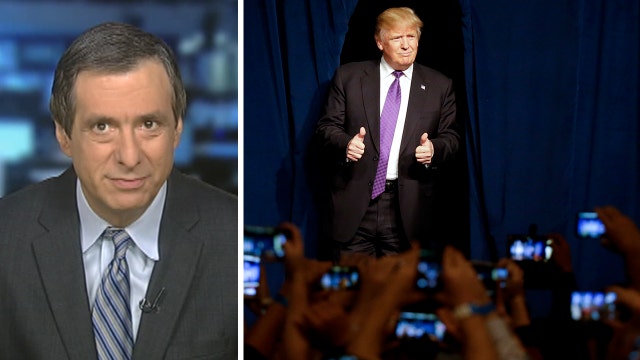Kurtz: Media view Trump as unstoppable
'MediaBuzz' host reacts to the shifting views towards Donald Trump's candidacy after his win in Nevada
I was sitting on the Fox News set at midnight with the Nevada polls about to close, knowing that Donald Trump was almost certain to win the caucuses but unsure how long it would take to make the call.
By 12:01 nearly everyone had given Trump the victory--he went on to rout Marco Rubio and Ted Cruz with 46 percent of the vote. And the bandwagon effect was instantaneous.
The media spent months assuring us there was no way Donald Trump could win the nomination. Now they seem to be saying there’s no way he can lose.
But in Round 257 of how the GOP establishment is scheming to stop Trump, the plan du jour seems to be coalescing around Rubio. This involves growing pressure to push John Kasich and Ben Carson and maybe even Cruz out of the race—and pundits are adding to the din by declaring they have no hope of nomination and should pack it in.
The Trump campaign finds this speculation amusing. Those around the billionaire see this as an effort by the mainstream media to prolong the horse race, to keep the story going.
Let’s assume that Trump magically found himself in a one-on-one with Rubio.
The fact that Trump’s share of the vote has steadily increased since Iowa shows he is picking up support from rivals who drop out, in their view. And the record GOP turnout in the first four states, they believe, demonstrates how Trump is expanding the electorate by attracting new voters.
His advisers also believe the media are trying to have it both ways. Since Trump won 46 percent of the Nevada caucuses, it’s easy to say that 54 percent of the voters were against him. But by the same math, 79 percent voted for someone other than Rubio—and Nevada was supposed to be a strong state for him because Marco grew up there.
And the math greatly favors Trump in some states. A Rutgers poll in New Jersey gives Trump 38 percent, Rubio 11, Cruz 10, Kasich 8 and Carson 5—meaning he would win even if every supporter of the other candidates fell in line for Rubio (which is of course extremely unlikely). The same is true in Massachusetts, where Trump has 50 percent in an Emerson College poll, Rubio 16, Kasich 13, Cruz 10 and Carson 2.
Winning has a way of creating an aura around a candidate. John McCain seemed like a loser in 2008 until he started notching primary wins. Same for Mitt Romney in 2012. And with Trump now winning three straight contests, a lot of the media chatter about his ceiling and his high negatives is starting to fade. Your ceiling tends to grow as other candidates drop out and you consolidate support.
And while entrance polls are far from perfect, especially with a small sample, they indicate that Trump won the Hispanic vote in Nevada. That’s a pretty amazing outcome for a guy running against two Cuban-Americans who began his campaign with highly controversial remarks about illegal Mexican immigrants.
The problem is that Rubio and Cruz are locked in a demolition derby while Trump’s luxury jet soars above them. Cruz is in a tough spot, with the media attaching a “dirty tricks” label to his campaign and his failure to win the evangelical vote in Nevada and South Carolina. He has to win his home state of Texas on Super Tuesday. And he shows no inclination to pull out.
Unlike Cruz, Rubio hasn’t really mounted a frontal attack on Trump. And Trump has taken only a few swipes at how the Florida senator drinks plenty of water and sweats a lot. Getting into a street brawl with Trump is risky, as Cruz has learned, and there’s a reason Marco hasn’t fully engaged beyond his stated goal of not beating up on other Republicans. Going toe-to-toe with Trump could be brutal.
Still, there’s a growing media drumbeat for such a showdown. National Review’s Jonah Goldberg is in that camp, after making this admission:
“Nearly everyone, including yours truly, believed that Trump’s candidacy would exhaust itself on its own terms.”
Goldberg writes that “Marco Rubio is now the only plausible alternative to Trump… And Cruz is unlikely to stop running for president because that’s all he knows how to do.”
His solution? “A Rubio–Cruz ticket. Cruz won’t work at the top of the ticket for the simple reason that too many GOP quislings fear Cruz more than Trump. But a unity ticket — a la Reagan–Bush in 1980 — in the form of Los Hermanos Cubanos might just do the trick.”
Another fierce conservative critic, the Weekly Standard’s Bill Kristol, pleads for Keeping Hope Alive:
“We are now being treated to a wave of Donald Trump fatalism. Yes, he's defied expectations in a pretty remarkable way. Yes, he's won three of the first four GOP contests. Yes, he's ahead in the polls in the states coming up. Yes, he has an easier path to victory than any other candidate. But only four states—about 1.2 million people—have actually cast ballots.”
But Kristol’s executive editor, Fred Barnes, writes on the same page under the headline “Trump Close to Winning the Republican Nomination.”
In his victory speech, Trump declared: “We won with evangelicals, we won with young, we won with old, we won with highly educated, we won with poorly educated--I love the poorly educated!”
It was the kind of blunt phrase that would make another candidate’s supporters cringe, but which Trump fans love because he doesn’t speak in sanitized political language.
And you don’t need a doctorate to know that no one has figured out how to stop Trump from winning.













































